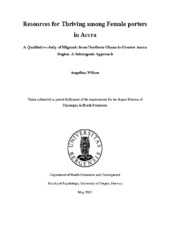| dc.description.abstract | Migration of people has become a common economic activity that individuals depend on to improve their status. Women in the Northern part of Ghana have found migration and working as female porters in the Greater Accra Region as a viable source of livelihood because of their poor socio-economic status. This source of livelihood is wrought with so many difficulties. Despite this, some of the women who migrate are able to thrive. In this study, thriving has come to encompass the process and ability to adjust to unfavorable situations and still enjoy some level of happiness. Thriving female porters have developed means of enjoying well-being in the face of mental, physical and social problems they encounter. Since some of these women living in Accra have been able to thrive, this study has set out to find out the resources for health and well-being among them. This will provide a different perspective to research on internal migration in Ghana that is focused on the stressors and resources. It will also provide practical guidelines on how the lives of future female porters in Accra can be improved. A phenomenological study involving eight face to face interviews, two group interviews and personal observation was used. The interview participants were women between the ages of twenty to twenty-five from the Upper east, Upper west and Northern regions. These women have lived and worked an average of a year or more in Accra. The women chosen for this study work as female porters and this involve carrying wares on their head for a fee. A semi-structured interview guide was used and was modified throughout the field visit in June 2011. There were two levels of analysis, a within-case analysis and cross case analysis using thematic coding. The cross-case analysis allowed for a comparison between the women in order to identify those who were thriving and those not thriving. Data from only the eight face to face interviews were reported in this study. The results indicated that there are certain resources necessary for thriving and the effectiveness of these resources for combating stress is dependent on how well the resources are managed. Resources include financial security, social support and religious belief. A positive perception of one's life experience has also been identified as important if the resources will be useful in combating stress. Acculturative stress was dealt with by employing separation strategies and understanding the need for efficiency in their new environment. The Sense of coherence scale could not be used to measure the level of the women's sense of coherence so no conclusion could be drawn regarding it. Implications of this study for the practice of health promotion include the fact that the resource-oriented approach is practicable and should be used in interventions. Female porters can actually thrive in the South if necessary utilities and resources are put in place by government and other concerned civil institutions. | en_US |
